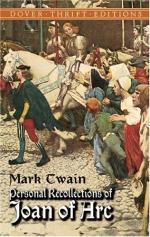The judges laid their heads together and began to talk now. It was plain, from chance words which one caught now and then, that Cauchon and Loyseleur were insisting upon the application of the torture, and that most of the others were urgently objecting.
Finally Cauchon broke out with a good deal of asperity in his voice and ordered Joan back to her dungeon. That was a happy surprise for me. I was not expecting that the Bishop would yield.
When Manchon came home that night he said he had found out why the torture was not applied.
There were two reasons. One was, a fear that Joan might die under the torture, which would not suit the English at all; the other was, that the torture would effect nothing if Joan was going to take back everything she said under its pains; and as to putting her mark to a confession, it was believed that not even the rack would ever make her do that.
So all Rouen laughed again, and kept it up for three days, saying:
“The sow has littered six times, and made six messes of it.”
And the palace walls got a new decoration—a mitered hog carrying a discarded rack home on its shoulder, and Loyseleur weeping in its wake. Many rewards were offered for the capture of these painters, but nobody applied. Even the English guard feigned blindness and would not see the artists at work.
The Bishop’s anger was very high now. He could not reconcile himself to the idea of giving up the torture. It was the pleasantest idea he had invented yet, and he would not cast it by. So he called in some of his satellites on the twelfth, and urged the torture again. But it was a failure.
With some, Joan’s speech had wrought an effect; others feared she might die under torture; others did not believe that any amount of suffering could make her put her mark to a lying confession. There were fourteen men present, including the Bishop. Eleven of them voted dead against the torture, and stood their ground in spite of Cauchon’s abuse. Two voted with the Bishop and insisted upon the torture. These two were Loyseleur and the orator—the man whom Joan had bidden to “read his book”—Thomas de Courcelles, the renowned pleader and master of eloquence.
Age has taught me charity of speech; but it fails me when I think of those three names—Cauchon, Courcelles, Loyseleur.
[1] Hog, pig.
[2] Cochonner, to litter, to farrow; also, “to make a mess of”!
[3] The lower half of it remains to-day just as it was then; the upper half is of a later date. — Translator.
17 Supreme in Direst Peril
Another ten days’ wait. The great theologians of that treasury of all valuable knowledge and all wisdom, the University of Paris, were still weighing and considering and discussing the Twelve Lies.




